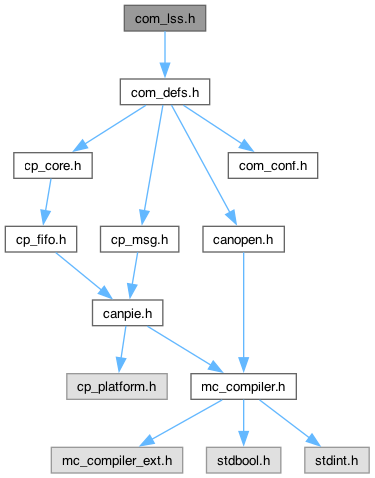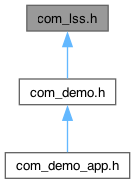Detailed Description
LSS offers the possibility to inquire and change the settings of certain parameters of the local layers on a CANopen module with LSS Slave capabilities by a CANopen module with LSS Master capabilities via the CAN Network. The following parameters can be inquired and/or changed by the use of LSS:
- Node-ID of the CANopen Slave
- Bit timing parameters of the physical layer (baud rate)
- LSS address (Identity Object, Index 1018H)
By using LSS a LSS Slave can be configured for a CANopen network without using any devices like DIP-switches for setting the parameters.
#include "com_defs.h" Include dependency graph for com_lss.h:
Include dependency graph for com_lss.h: This graph shows which files directly or indirectly include this file:
This graph shows which files directly or indirectly include this file:Data Structures | |
| struct | ComLssAddress_s |
Typedefs | |
| typedef struct ComLssAddress_s | ComLssAddress_ts |
Enumerations | |
| enum | ComLssMode_e { eCOM_LSS_MODE_WAITING = 0 , eCOM_LSS_MODE_CONFIGURATION } |
| enum | ComLssProt_e { } |
| enum | ComLssStat_e { eCOM_LSS_STAT_ACTIVE = 1 , eCOM_LSS_STAT_SUCCESS , eCOM_LSS_STAT_ERROR , eCOM_LSS_STAT_TIMEOUT } |
| enum | ComLssInqSrv_e { eCOM_LSS_INQ_SRV_VID = 0 , eCOM_LSS_INQ_SRV_PRD , eCOM_LSS_INQ_SRV_REV , eCOM_LSS_INQ_SRV_SRN , eCOM_LSS_INQ_SRV_NID } |
Functions | |
| ComStatus_tv | ComLssConfigureBitTiming (uint8_t ubNetV, uint8_t ubBittimeSelV) |
| ComStatus_tv | ComLssConfigureNodeId (uint8_t ubNetV, uint8_t ubNodeIdV) |
| void | ComLssEventReceive (uint8_t ubNetV, uint8_t ubLssProtocolV) |
| ComStatus_tv | ComLssFastscan (uint8_t ubNetV, uint32_t ulVendorIdV, uint32_t ulProdCodeV, uint32_t ulRevisionNumV, uint32_t ulSerialNumV) |
| uint32_t | ComLssGetAddrSerialNum (uint8_t ubNetV) |
| ComStatus_tv | ComLssGetIdentity (uint8_t ubNetV, ComLssAddress_ts *ptsLssAddressV) |
| ComStatus_tv | ComLssGetStatus (uint8_t ubNetV, uint8_t *pubStatusV) |
| ComStatus_tv | ComLssIdentifyNonConfiguredSlave (uint8_t ubNetV) |
| ComStatus_tv | ComLssIdentifyRemoteSlave (uint8_t ubNetV, uint32_t ulVendorIdV, uint32_t ulProdCodeV, uint32_t ulRevisionNumLowV, uint32_t ulRevisionNumHighV, uint32_t ulSerialNumLowV, uint32_t ulSerialNumHighV) |
| ComStatus_tv | ComLssInquiryService (uint8_t ubNetV, uint8_t ubServiceV) |
| ComStatus_tv | ComLssSetTimeout (uint8_t ubNetV, uint16_t uwTimeV) |
| ComStatus_tv | ComLssStoreConfiguration (uint8_t ubNetV) |
| ComStatus_tv | ComLssSwitchModeGlobal (uint8_t ubNetV, uint8_t ubModeV) |
| ComStatus_tv | ComLssSwitchModeSelective (uint8_t ubNetV, uint32_t ulVendorIdV, uint32_t ulProdCodeV, uint32_t ulRevisionNumV, uint32_t ulSerialNumV) |
Typedef Documentation
◆ ComLssAddress_ts
| typedef struct ComLssAddress_s ComLssAddress_ts |
CANopen Master - LSS address.
The structure ComLssAddress_s defines a 128-bit number to identify each node uniquely, consisting of the vendor-ID, product code, revision number and serial number with 32 bit each, defined in /CiA301/ object 1018h. The value can be determined by calling ComLssGetIdentity() after an successful LSS fastscan procedure.
Enumeration Type Documentation
◆ ComLssInqSrv_e
| enum ComLssInqSrv_e |
◆ ComLssMode_e
| enum ComLssMode_e |
- See also
- ComLssSwitchModeGlobal() LSS mode
This enumeration defines the allowed modes for the LSS switch mode global command.
| Enumerator | |
|---|---|
| eCOM_LSS_MODE_WAITING | switch LSS state machine to LSS waiting mode |
| eCOM_LSS_MODE_CONFIGURATION | switch LSS state machine to LSS configuration mode |
◆ ComLssProt_e
| enum ComLssProt_e |
CANopen Master LSS protocol
◆ ComLssStat_e
| enum ComLssStat_e |
Function Documentation
◆ ComLssConfigureBitTiming()
| ComStatus_tv ComLssConfigureBitTiming | ( | uint8_t | ubNetV, |
| uint8_t | ubBittimeSelV ) |
- Parameters
-
[in] ubNetV CANopen Network channel [in] ubBittimeSelV New bit-timing value
- Returns
- Value of enumeration ComErr_e
By means of the Configure Bit Timing Parameters service the LSS Master sets the new bit-timing on a LSS Slave.
◆ ComLssConfigureNodeId()
| ComStatus_tv ComLssConfigureNodeId | ( | uint8_t | ubNetV, |
| uint8_t | ubNodeIdV ) |
- Parameters
-
[in] ubNetV CANopen Network channel [in] ubNodeIdV New Node-ID value
- Returns
- Value of enumeration ComErr_e
By means of this service the LSS Master configures the NMT-address parameter of a LSS Slave. This service allows only one LSS Slave in configuration mode. The remote result parameter confirms the success or failure of the service. In case of a failure optionally the reason is confirmed.
◆ ComLssEventReceive()
| void ComLssEventReceive | ( | uint8_t | ubNetV, |
| uint8_t | ubLssProtocolV ) |
- Parameters
-
[in] ubNetV CANopen Network channel [in] ubLssProtocolV LSS protocol
The function is called by the LSS master state machine upon reception of a LSS response message issued by the LSS slave device. The parameter ubNetV defines the CANopen network. The value of the parameter ubLssProtocolV is defined by the enumeration ComLssProt_e.
An example implementation is available in the file com_user.c.
◆ ComLssFastscan()
| ComStatus_tv ComLssFastscan | ( | uint8_t | ubNetV, |
| uint32_t | ulVendorIdV, | ||
| uint32_t | ulProdCodeV, | ||
| uint32_t | ulRevisionNumV, | ||
| uint32_t | ulSerialNumV ) |
- Parameters
-
[in] ubNetV CANopen Network channel [in] ulVendorIdV Vendor ID (1018h, sub 1) [in] ulProdCodeV Product code (1018h, sub 2) [in] ulRevisionNumV Revision number (1018h, sub 3) [in] ulSerialNumV Serial number (1018h, sub 4)
- Returns
- Value of enumeration ComErr_e
◆ ComLssGetAddrSerialNum()
| uint32_t ComLssGetAddrSerialNum | ( | uint8_t | ubNetV | ) |
- Deprecated
- This function is deprecated and will be removed in a future version of the CANopen Master protocol stack. Please use ComLssGetIdentity() as a replacement.
- Parameters
-
[in] ubNetV CANopen Network channel
- Returns
- Serial number
The function returns the serial number of a LSS slave device that was found by the LSS fastscan protocol.
◆ ComLssGetIdentity()
| ComStatus_tv ComLssGetIdentity | ( | uint8_t | ubNetV, |
| ComLssAddress_ts * | ptsLssAddressV ) |
- Parameters
-
[in] ubNetV CANopen Network channel [in,out] ptsLssAddressV Pointer to LSS address structure
- Returns
- Value of enumeration ComErr_e
The function allows access to the elements of the LSS address structure ComLssAddress_ts after a LSS slave device was found by the LSS fastscan protocol.
◆ ComLssGetStatus()
| ComStatus_tv ComLssGetStatus | ( | uint8_t | ubNetV, |
| uint8_t * | pubStatusV ) |
- Parameters
-
[in] ubNetV CANopen Network channel [in] pubStatusV Pointer to status variable
- Returns
- Value of enumeration ComErr_e
This function returns the status of the LSS master state machine. Valid codes passes the the pointer pubStatusV are given in the enumeration ComLssStat_e.
◆ ComLssIdentifyNonConfiguredSlave()
| ComStatus_tv ComLssIdentifyNonConfiguredSlave | ( | uint8_t | ubNetV | ) |
- Parameters
-
[in] ubNetV CANopen Network channel
- Returns
- Value of enumeration ComErr_e
This function starts the Identify non-configured remote slave protocol. If there are non-configured remote slaves in the network, the status will be set to eCOM_LSS_STAT_SUCCESS, otherwise the status will be eCOM_LSS_STAT_TIMEOUT.
◆ ComLssIdentifyRemoteSlave()
| ComStatus_tv ComLssIdentifyRemoteSlave | ( | uint8_t | ubNetV, |
| uint32_t | ulVendorIdV, | ||
| uint32_t | ulProdCodeV, | ||
| uint32_t | ulRevisionNumLowV, | ||
| uint32_t | ulRevisionNumHighV, | ||
| uint32_t | ulSerialNumLowV, | ||
| uint32_t | ulSerialNumHighV ) |
- Parameters
-
[in] ubNetV CANopen Network channel [in] ulVendorIdV Vendor ID (1018h, sub 1) [in] ulProdCodeV Product code (1018h, sub 2) [in] ulRevisionNumLowV Revision number (1018h, sub 3) [in] ulRevisionNumHighV Revision number (1018h, sub 3) [in] ulSerialNumLowV Serial number (1018h, sub 4) [in] ulSerialNumHighV Serial number (1018h, sub 4)
- Returns
- Value of enumeration ComErr_e
This function starts the Identify remote slave protocol. The boundaries are included in the interval. All LSS slave devices with matching vendor-ID and product-code and whose major revision-number and serial-numbers are located within the given ranges, shall identify themselves with the LSS identify slave service.
◆ ComLssInit()
| ComStatus_tv ComLssInit | ( | uint8_t | ubNetV, |
| uint8_t | ubBitrateSelectV, | ||
| uint32_t | ulModeV ) |
◆ ComLssInquiryService()
| ComStatus_tv ComLssInquiryService | ( | uint8_t | ubNetV, |
| uint8_t | ubServiceV ) |
- Parameters
-
[in] ubNetV CANopen Network channel [in] ubServiceV Service type (ComLssInqSrv_e)
- Returns
- Value of enumeration ComErr_e
The inquiry services are available only in configuration mode.
◆ ComLssMessageHandler()
| void ComLssMessageHandler | ( | uint8_t | ubNetV | ) |
◆ ComLssSetTimeout()
| ComStatus_tv ComLssSetTimeout | ( | uint8_t | ubNetV, |
| uint16_t | uwTimeV ) |
- Parameters
-
[in] ubNetV CANopen Network channel [in] uwTimeV Timeout value in milliseconds
- Returns
- Value of enumeration ComErr_e
This function sets a timeout value for a LSS communication. If the response to a LSS request by the master takes longer than this timeout value, the state of the communication will be changed to eCOM_LSS_STAT_TIMEOUT. The state of the LSS communication can be evaluated by calling ComLssGetStatus(). Please note that the timeout value is a multiple of the timer period (COM_TIMER_PERIOD). A value supplied to this function will be rounded towards the next lower value if necessary.
For LSS Fastscan, the configured timeout value is uwTimeV / 10 in order to increase the speed of # Fastscan algorithm.
◆ ComLssStoreConfiguration()
| ComStatus_tv ComLssStoreConfiguration | ( | uint8_t | ubNetV | ) |
- Parameters
-
[in] ubNetV CANopen Network channel
- Returns
- Value of enumeration ComErr_e
This function is used to store the configured parameters.
◆ ComLssSwitchModeGlobal()
| ComStatus_tv ComLssSwitchModeGlobal | ( | uint8_t | ubNetV, |
| uint8_t | ubModeV ) |
- Parameters
-
[in] ubNetV CANopen Network channel [in] ubModeV LSS mode
- Returns
- Value of enumeration ComErr_e
- See also
- ComLssSwitchModeSelective()
The Switch Mode Services control the mode attribute of a LSS Slave. LSS provides three ways to put LSS Slave into configuration mode:
- Switch Mode Global - ComLssSwitchModeGlobal()
- Switch Mode Selective - ComLssSwitchModeSelective()
- Fastscan - ComLssFastscan()
Switch Mode Selective and Fastscan switch exactly one LSS Slave from operation mode to configuration mode. Switch Mode Global switches all LSS Slaves from operation mode to configuration mode and vice versa.
Possible values for the parameter ubModeV are defined by the enumeration ComLssMode_e.
◆ ComLssSwitchModeSelective()
| ComStatus_tv ComLssSwitchModeSelective | ( | uint8_t | ubNetV, |
| uint32_t | ulVendorIdV, | ||
| uint32_t | ulProdCodeV, | ||
| uint32_t | ulRevisionNumV, | ||
| uint32_t | ulSerialNumV ) |
- Parameters
-
[in] ubNetV CANopen Network channel [in] ulVendorIdV Vendor ID (1018h, sub 1) [in] ulProdCodeV Product code (1018h, sub 2) [in] ulRevisionNumV Revision number (1018h, sub 3) [in] ulSerialNumV Serial number (1018h, sub 4)
- Returns
- Value of enumeration ComErr_e
- See also
- ComLssSwitchModeGlobal()
The Switch Mode Services control the mode attribute of a LSS Slave.
◆ ComLssTmrEvent()
| void ComLssTmrEvent | ( | uint8_t | ubNetV | ) |

